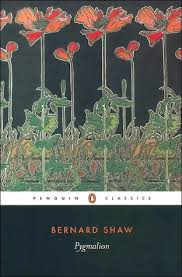Pygmalion Page #5
Pygmalion is a play by George Bernard Shaw, named after a Greek mythological figure. It was first presented on stage to the public in 1913. In ancient Greek mythology, Pygmalion fell in love with one of his sculptures, which then came to life.
FREDDY. And left me with a cab on my hands. Damnation! THE FLOWER GIRL [with grandeur] Never you mind, young man. I'm going home in a taxi. [She sails off to the cab. The driver puts his hand behind him and holds the door firmly shut against her. Quite understanding his mistrust, she shows him her handful of money]. Eightpence ain't no object to me, Charlie. [He grins and opens the door]. Angel Court, Drury Lane, round the corner of Micklejohn's oil shop. Let's see how fast you can make her hop it. [She gets in and pulls the door to with a slam as the taxicab starts]. FREDDY. Well, I'm dashed! ACT II Next day at 11 a.m. Higgins's laboratory in Wimpole Street. It is a room on the first floor, looking on the street, and was meant for the drawing-room. The double doors are in the middle of the back hall; and persons entering find in the corner to their right two tall file cabinets at right angles to one another against the walls. In this corner stands a flat writing-table, on which are a phonograph, a laryngoscope, a row of tiny organ pipes with a bellows, a set of lamp chimneys for singing flames with burners attached to a gas plug in the wall by an indiarubber tube, several tuning-forks of different sizes, a life-size image of half a human head, showing in section the vocal organs, and a box containing a supply of wax cylinders for the phonograph. Further down the room, on the same side, is a fireplace, with a comfortable leather-covered easy-chair at the side of the hearth nearest the door, and a coal-scuttle. There is a clock on the mantelpiece. Between the fireplace and the phonograph table is a stand for newspapers. On the other side of the central door, to the left of the visitor, is a cabinet of shallow drawers. On it is a telephone and the telephone directory. The corner beyond, and most of the side wall, is occupied by a grand piano, with the keyboard at the end furthest from the door, and a bench for the player extending the full length of the keyboard. On the piano is a dessert dish heaped with fruit and sweets, mostly chocolates. The middle of the room is clear. Besides the easy chair, the piano bench, and two chairs at the phonograph table, there is one stray chair. It stands near the fireplace. On the walls, engravings; mostly Piranesis and mezzotint portraits. No paintings. Pickering is seated at the table, putting down some cards and a tuning-fork which he has been using. Higgins is standing up near him, closing two or three file drawers which are hanging out. He appears in the morning light as a robust, vital, appetizing sort of man of forty or thereabouts, dressed in a professional-looking black frock-coat with a white linen collar and black silk tie. He is of the energetic, scientific type, heartily, even violently interested in everything that can be studied as a scientific subject, and careless about himself and other people, including their feelings. He is, in fact, but for his years and size, rather like a very impetuous baby "taking notice" eagerly and loudly, and requiring almost as much watching to keep him out of unintended mischief. His manner varies from genial bullying when he is in a good humor to stormy petulance when anything goes wrong; but he is so entirely frank and void of malice that he remains likeable even in his least reasonable moments. HIGGINS [as he shuts the last drawer] Well, I think that's the whole show. PICKERING. It's really amazing. I haven't taken half of it in, you know. HIGGINS. Would you like to go over any of it again? PICKERING [rising and coming to the fireplace, where he plants himself with his back to the fire] No, thank you; not now. I'm quite done up for this morning. HIGGINS [following him, and standing beside him on his left] Tired of listening to sounds? PICKERING. Yes. It's a fearful strain. I rather fancied myself because I can pronounce twenty-four distinct vowel sounds; but your hundred and thirty beat me. I can't hear a bit of difference between most of them. HIGGINS [chuckling, and going over to the piano to eat sweets] Oh, that comes with practice. You hear no difference at first; but you keep on listening, and presently you find they're all as different as A from B. [Mrs. Pearce looks in: she is Higgins's housekeeper] What's the matter? MRS. PEARCE [hesitating, evidently perplexed] A young woman wants to see you, sir. HIGGINS. A young woman! What does she want? MRS. PEARCE. Well, sir, she says you'll be glad to see her when you know what she's come about. She's quite a common girl, sir. Very common indeed. I should have sent her away, only I thought perhaps you wanted her to talk into your machines. I hope I've not done wrong; but really you see such queer people sometimes--you'll excuse me, I'm sure, sir-- HIGGINS. Oh, that's all right, Mrs. Pearce. Has she an interesting accent? MRS. PEARCE. Oh, something dreadful, sir, really. I don't know how you can take an interest in it. HIGGINS [to Pickering] Let's have her up. Show her up, Mrs. Pearce [he rushes across to his working table and picks out a cylinder to use on the phonograph]. MRS. PEARCE [only half resigned to it] Very well, sir. It's for you to say. [She goes downstairs]. HIGGINS. This is rather a bit of luck. I'll show you how I make records. We'll set her talking; and I'll take it down first in Bell's visible Speech; then in broad Romic; and then we'll get her on the phonograph so that you can turn her on as often as you like with the written transcript before you. MRS. PEARCE [returning] This is the young woman, sir. The flower girl enters in state. She has a hat with three ostrich feathers, orange, sky-blue, and red. She has a nearly clean apron, and the shoddy coat has been tidied a little. The pathos of this deplorable figure, with its innocent vanity and consequential air, touches Pickering, who has already straightened himself in the presence of Mrs. Pearce. But as to Higgins, the only distinction he makes between men and women is that when he is neither bullying nor exclaiming to the heavens against some featherweight cross, he coaxes women as a child coaxes its nurse when it wants to get anything out of her. HIGGINS [brusquely, recognizing her with unconcealed disappointment, and at once, baby-like, making an intolerable grievance of it] Why, this is the girl I jotted down last night. She's no use: I've got all the records I want of the Lisson Grove lingo; and I'm not going to waste another cylinder on it. [To the girl] Be off with you: I don't want you. THE FLOWER GIRL. Don't you be so saucy. You ain't heard what I come for yet. [To Mrs. Pearce, who is waiting at the door for further instruction] Did you tell him I come in a taxi? MRS. PEARCE. Nonsense, girl! what do you think a gentleman like Mr. Higgins cares what you came in? THE FLOWER GIRL. Oh, we are proud! He ain't above giving lessons, not him: I heard him say so. Well, I ain't come here to ask for any compliment; and if my money's not good enough I can go elsewhere.
Translation
Translate and read this book in other languages:
Select another language:
- - Select -
- 简体中文 (Chinese - Simplified)
- 繁體中文 (Chinese - Traditional)
- Español (Spanish)
- Esperanto (Esperanto)
- 日本語 (Japanese)
- Português (Portuguese)
- Deutsch (German)
- العربية (Arabic)
- Français (French)
- Русский (Russian)
- ಕನ್ನಡ (Kannada)
- 한국어 (Korean)
- עברית (Hebrew)
- Gaeilge (Irish)
- Українська (Ukrainian)
- اردو (Urdu)
- Magyar (Hungarian)
- मानक हिन्दी (Hindi)
- Indonesia (Indonesian)
- Italiano (Italian)
- தமிழ் (Tamil)
- Türkçe (Turkish)
- తెలుగు (Telugu)
- ภาษาไทย (Thai)
- Tiếng Việt (Vietnamese)
- Čeština (Czech)
- Polski (Polish)
- Bahasa Indonesia (Indonesian)
- Românește (Romanian)
- Nederlands (Dutch)
- Ελληνικά (Greek)
- Latinum (Latin)
- Svenska (Swedish)
- Dansk (Danish)
- Suomi (Finnish)
- فارسی (Persian)
- ייִדיש (Yiddish)
- հայերեն (Armenian)
- Norsk (Norwegian)
- English (English)
Citation
Use the citation below to add this book to your bibliography:
Style:MLAChicagoAPA
"Pygmalion Books." Literature.com. STANDS4 LLC, 2025. Web. 7 Jan. 2025. <https://www.literature.com/book/pygmalion_78>.




Discuss this Pygmalion book with the community:
Report Comment
We're doing our best to make sure our content is useful, accurate and safe.
If by any chance you spot an inappropriate comment while navigating through our website please use this form to let us know, and we'll take care of it shortly.
Attachment
You need to be logged in to favorite.
Log In